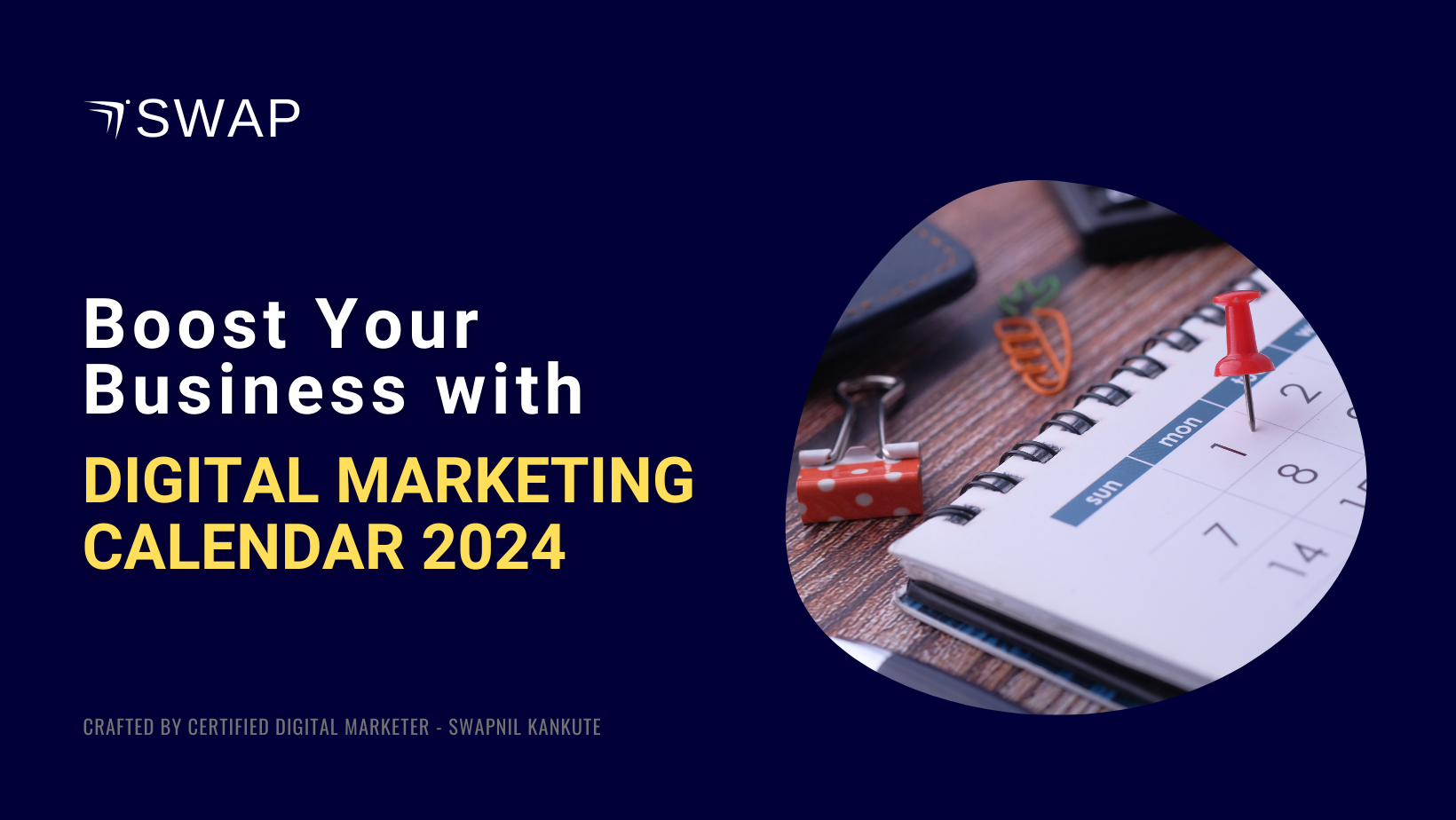Table of Contents
ToggleIntroduction
Are you tired of scrambling to get your marketing campaigns out the door? Ever wonder how successful brands seem to always be on top of their game? The secret is simpler than you might think: a well-organized digital marketing calendar. Let’s dive into what a digital marketing calendar is, why it’s crucial for your business in 2024, and how you can create one that keeps your marketing efforts streamlined and effective.
I am Swapnil Kankute, Certified Digital Marketing Consultant, and this digital marketing plan and strategy is designed for boosting your business in the digital realm.
Understanding the Basics
What is a Digital Marketing Calendar?
A digital marketing calendar is essentially a roadmap for all your marketing activities. It outlines what needs to be done, when it needs to be done, and who is responsible for each task. From content creation and social media posts to email campaigns and SEO strategies, a digital marketing calendar ensures that everything is planned and executed seamlessly.
Importance of a Digital Marketing Calendar in 2024
In 2024, the digital marketing landscape is more dynamic than ever. With constant algorithm updates, new social media platforms, and evolving consumer behaviors, having a solid plan is essential. A digital marketing calendar helps you stay organized, ensures consistency, and allows you to proactively adapt to changes. Check out this guide for more insights.
Planning Your Year
Setting Annual Goals
Before you can fill in the details, start with your big-picture goals. What do you want to achieve this year? Increased brand awareness? Higher engagement? More sales? Having clear objectives will guide your monthly and weekly planning. For a comprehensive overview, visit this link.
Aligning Your Calendar with Business Objectives
Your marketing calendar should reflect your business goals. If your objective is to launch a new product, your calendar will focus heavily on pre-launch teasers, launch events, and post-launch follow-ups. Align your marketing efforts with your broader business strategy for maximum impact. More details can be found here.
Monthly Planning
Breaking Down Annual Goals into Monthly Milestones
Once you have your annual goals, break them down into manageable monthly milestones. This helps you stay on track and makes the larger goals seem less daunting. For a detailed guide, see this resource.
Key Monthly Marketing Themes
Assign a theme or focus for each month. For instance, January might be about “New Beginnings” to align with New Year resolutions, while February could focus on “Love and Relationships” to tie in with Valentine’s Day. These themes help in creating cohesive and timely marketing messages. For more ideas, visit this page.
Weekly and Daily Planning
Importance of Weekly Reviews
Weekly reviews are crucial to ensure you’re on track. Set aside time each week to assess what worked, what didn’t, and what needs to be adjusted. This helps in maintaining momentum and staying flexible. Learn more about this process here.
Daily Task Management
Break down your weekly plans into daily tasks. Use to-do lists, task management tools, and calendar reminders to ensure that no detail is overlooked. This daily diligence is key to executing your marketing strategy effectively. For practical tips, check out this link.
Content Planning
Content Calendar vs. Marketing Calendar
While a marketing calendar covers all aspects of your strategy, a content calendar specifically focuses on the creation and distribution of content. Both are essential and should work in tandem. More information can be found here.
Types of Content to Include
Diversify your content to keep your audience engaged. Include blog posts, social media updates, videos, infographics, and newsletters. Ensure that your content aligns with your monthly themes and overall marketing goals. For detailed suggestions, visit this link.
Campaign Planning
Seasonal Campaigns
Plan campaigns around seasons and holidays. For instance, a summer sale or a Christmas promotion. These campaigns are effective because they tap into existing consumer behaviors and trends. Find out more about planning these campaigns here.
Event-Based Campaigns
Capitalize on events like product launches, company anniversaries, or industry conferences. Event-based campaigns can generate buzz and provide a timely reason for your audience to engage with your brand. More information can be found here.
Social Media Integration
Scheduling Social Media Posts
Use scheduling tools to plan your social media posts in advance. This ensures a consistent presence and frees up time to engage with your audience in real-time. For tools and tips, check out this page.
Tracking Social Media Metrics
Regularly track metrics like engagement, reach, and conversions. This data helps in refining your social media strategy and ensuring that your efforts are driving the desired results. Learn more about tracking metrics here.
SEO and Blog Management
Planning Blog Posts
Plan your blog content around your monthly themes and SEO keywords. Regular, high-quality blog posts can drive traffic to your site and improve your search engine rankings. For more on blog planning, visit this link.
SEO Strategies and Deadlines
Set deadlines for keyword research, on-page optimization, and link-building activities. SEO is an ongoing process, and having it integrated into your calendar ensures that it gets the attention it needs. For a detailed guide, check out this page.
Email Marketing Schedule
Creating an Email Marketing Calendar
Plan your email campaigns ahead of time. Outline the purpose of each email, whether it’s a newsletter, promotional offer, or follow-up. Schedule these emails to ensure consistent communication with your audience. For more insights, visit this link.
Best Practices for Email Campaigns
Segment your email list to send targeted messages. Personalization and relevance are key to effective email marketing. Monitor your email metrics and adjust your strategy based on open rates, click-through rates, and conversions. For best practices, see this page.
Paid Advertising
Scheduling PPC Campaigns
Plan your pay-per-click (PPC) campaigns around your key marketing periods. Allocate your budget based on anticipated ROI and adjust as needed based on campaign performance. For more tips on PPC scheduling, visit this resource.
Analytics and Reporting
Setting Up a Reporting Schedule
Regular reporting is key to understanding the effectiveness of your marketing efforts. Set up a schedule to review analytics weekly, monthly, and quarterly. Use these reports to adjust your strategies and improve your outcomes. For more on setting up a reporting schedule, visit this link.
Analyzing and Adjusting Strategies
Use the data from your reports to make informed decisions about your marketing strategy. Are certain campaigns underperforming? Do you need to shift your focus or adjust your budget? Regular analysis and adjustment keep your marketing efforts agile and effective. For further guidance, see this page.
Collaborating with Teams
Assigning Roles and Responsibilities
A well-functioning marketing team knows who is responsible for what. Clearly define roles and responsibilities within your digital marketing calendar to ensure accountability and smooth execution. For tips on team collaboration, visit this link.
Communication and Feedback Loops
Effective communication is key to any team effort. Set up regular meetings and feedback loops to discuss progress, address issues, and refine strategies. For more on communication strategies, check out this page.
Staying Flexible
Adapting to Changes
The digital landscape is ever-changing, and so should your marketing calendar. Be prepared to adapt to new trends, platform changes, and unexpected events. Flexibility is crucial to staying relevant and effective. For advice on staying flexible, visit this resource.
Incorporating Feedback
Regularly seek feedback from your team and audience. Use this feedback to improve your marketing efforts and ensure that you are meeting the needs of your customers. For more on incorporating feedback, see this link.
Conclusion
Creating a digital marketing calendar for 2024 is a strategic move that can significantly enhance your marketing efforts. By setting clear goals, planning ahead, and staying flexible, you can ensure that your campaigns are well-coordinated and effective. Remember to regularly review and adjust your strategies based on performance data and feedback. For additional tips and detailed guides, visit this link.
Certified Digital Marketer with over a decade of expertise, Swapnil Kankute specializes in delivering profit-driving solutions through strategic digital marketing techniques. Decoding market trends and crafting winning strategies, Swapnil is your dedicated partner for business growth. Choose excellence. Choose success. Choose Swapnil Kankute.
FAQs
How often should I update my digital marketing calendar?
It’s advisable to update your digital marketing calendar at least monthly. This allows you to stay on top of any changes and ensure that your marketing activities remain aligned with your goals.
What’s the best tool for creating a digital marketing calendar?
There are many tools available, such as Google Calendar, Trello, Asana, and CoSchedule. Choose one that fits your needs and integrates well with your existing systems.
How detailed should my digital marketing calendar be?
The level of detail depends on your business needs. However, it’s generally beneficial to include specific tasks, deadlines, responsible parties, and any relevant notes for each marketing activity.
Can I use a digital marketing calendar for a small business?
Absolutely! A digital marketing calendar is beneficial for businesses of all sizes. It helps small businesses stay organized, plan ahead, and make the most of their limited resources.
How do I measure the success of my digital marketing calendar?
Success can be measured by tracking key performance indicators (KPIs) like engagement rates, conversion rates, website traffic, and ROI. Regularly review your goals and compare them with your results to assess the effectiveness of your calendar.
Source By : Professional Digital Marketing Expert, Certified Digital Marketer in Ahmedabad, Certified Digital Marketer India ,Certified Digital Marketer Mumbai , Internet Marketing Expert



